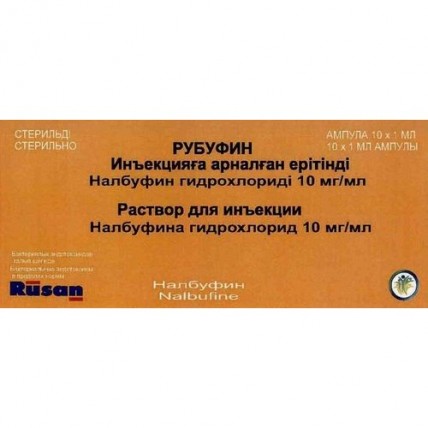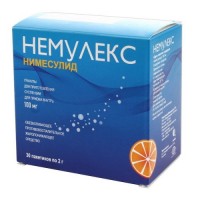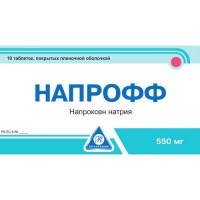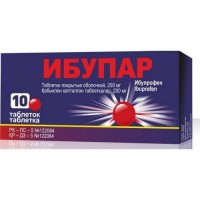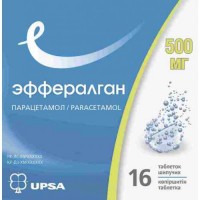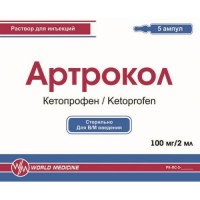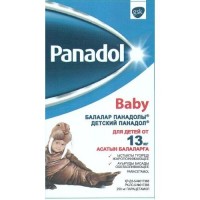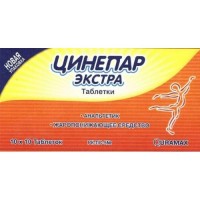Rubufin 10 mg / ml 1 ml 10s solution for injection in ampoules
- $64.00
Sku:
d59d12c1e137
Brand:
Rusan Pharma Ltd. (India)
The instruction for medical use of Rubufin Torgovoye medicine a name Rubufin Mezhdunarodnoye the unlicensed name Nalbufin Lekarstvennaya a form Solution for injections of 10 mg/ml and 20 mg/ml Structure contains One ml of solution: active agent: a nalbufina of a hydrochloride of a dihydrate it is equivalent to a nalbufin to a hydrochloride anhydrous - 10 mg or 20 mg, excipients: sodium bisulphate, citrate sodium a dihydrate, citric acid anhydrous, sodium chloride, water for injections. Description Transparent, colourless or almost colourless color liquid Pharmacotherapeutic group Analgetics. Opioids. Morphine derivatives. Nalbufin. The ATX N02AF02 code the Pharmacological Pharmacokinetics At properties in in introduction effect develops in 2-3 min., at p / to or in oil - in 10-15 min. The maximum effect - in 30-60 min., action duration in the absence of tolerance at p / to or introduction in oil - 3-6 h, in in introduction - 3-4 h. It is metabolized in a liver. It is removed in the form of metabolites with bile, in insignificant quantity — with urine. Gets through a placental barrier, during childbirth can cause respiratory depression in the newborn. It is excreted in breast milk. Elimination half-life — 2.5-3 h. A pharmacodynamics Agonist antagonist of opioid receptors (agonist a kappa - both delta receptors and the antagonist of a mu - opioid receptors). Activates an endogenous anti-nociceptive system through a kappa - opiate receptors, breaks mezhneyronalny transfer of painful impulses at the central nervous system various levels. Influencing the highest departments of a brain, changes emotional coloring of pain. Brakes conditioned reflexes, has sedative effect, causes a dysphoria, a miosis, excites the emetic center. To a lesser extent, than morphine, trimeperidine, fentanyl, oppresses a respiratory center and affects motility of a GIT. Does not influence a hemodynamics. The risk of emergence of histamine reaction and also development of accustoming and opioid dependence at controlled use is much lower, than for opioid agonists. Indications - as an additional tool at anesthesia, for preoperative and postoperative anesthesia, for an analgesia in obstetric practice during childbirth - for stopping of a pain syndrome of the moderate and expressed degree of intensity the Route of administration and doses Strictly on doctor's orders. The usual recommended dose for adults makes from 10 to 20 mg for patients with the body weight of 70 kg, everything that is equivalent to 0.1 - 0.3 mg/kg of body weight. The dose can be entered intravenously, intramusculary or subcutaneously, can be repeatedly entered every 4-6 hours. The maximum single dose for adults should not exceed 20 mg (0.3 mg/kg), the maximum daily dose - 2.4 mg/kg. Appointment duration - no more than 3 days. Elderly people the C care appoint to patients of advanced age, it is necessary to appoint drug from minimum effective dose. Children Drug is not recommended to be used to children aged up to 18 years, in connection with limited data on use in pediatrics. Side effects Side effects of a nalbufin are similar to morphine. Very often – a sedation Often – perspiration, drowsiness, a headache, dryness in a mouth, dizziness Infrequently - a tremor, nervousness, paresthesias, discomfort, a dysphoria, illegibility of visual perception, dacryagogue, spasms Seldom – respiratory depression is Very rare – euphoria, hallucinations, confusion of consciousness, a depression, fatigue, slackness, an uneasy dream, unusual dreams, bradycardia or tachycardia, disturbance of a warm rhythm, orthostatic hypotension, increase or lowering of arterial pressure, fervescence, a fluid lungs - allergic reactions (in hard cases – up to an acute anaphylaxis and a Quincke's edema) - a spasm of bilious ways with the subsequent increase in level of bilious enzymes, anorexia, toxic megacolon, paralytic intestinal impassability, hepatotoxicity (dark urine, a pale chair, an ikterichnost of scleras and integuments) - disturbance of outflow of urine or aggravation of this state in adenoma of a prostate and a stenosis of an urethra Others – sweating strengthening, morbidity in the place of an injection, medicinal dependence, a syndrome of cancellation of the Contraindication - hypersensitivity to drug or any ingredient of drug - the profound respiratory depression and central nervous system - at epidural and spinal anesthesia - a heavy renal and liver failure - an epileptic syndrome, intracranial hypertensia, a craniocereberal injury, acute alcoholic conditions, alcoholic psychosis, acute surgical diseases of abdominal organs (before establishment of the diagnosis), surgeries on a gepatobiliarny system (the spasm of a sphincter of Oddi is possible) - medicinal dependence on morfinopodobny drugs (morphine, Promedolum, fentanyl) — perhaps development of a withdrawal, diarrhea against the background of the psevdomembrazny colitis caused by cephalosporins, linkozamina, penicillin toxic dyspepsia - with care: advanced age, a cachexia, a liver and renal failure, respiratory insufficiency (including in chronic obstructive diseases of lungs, uraemia), premature births and probable immaturity of a fruit, cholelithiasis, heavy inflammatory bowel diseases, bronchial asthma, arrhythmia, arterial hypertension, a hypothyroidism, a prostate hyperplasia, the urethra stenosis, tendency to a suicide, emotional lability weakened patients. - It is not recommended to use drug without performing the corresponding diagnostics at a surgical belly syndrome as the nalbufina a hydrochloride can mask its manifestations. Medicinal interactions are Strengthened by the oppressing action on the central nervous system and breath of medicines for the general anesthesia, hypnotic drugs, antihistaminic, medicines with the central action, tranquilizers, sedative, anxiolytic, antipsychotic, antidepressants and muscle relaxants. Ethanol strengthens the oppressing action of a nalbufin the central nervous system. When using with antidpressant a dose of one or both drugs have to be reduced. Partially reduces analgeziruyushchy effect and respiratory depression of other opioid analgetik. Against the background of drug addiction, naltrexone accelerates development of symptoms of withdrawal (in 5 minutes after introduction and can proceed till 48 o'clock, difficult giving in to stopping). Medicines with anticholinergic activity, antidiarrheal drugs, including loperamide, increase risk of developing a constipation to intestinal impassability, an ischuria and oppression of central nervous system. Nalbufin strengthens hypotensive effect of the medicines reducing arterial blood pressure including ganglioblokator, diuretics. Reduces efficiency of Metoclopramidum. With care it is necessary to apply along with MAO inhibitors because of possible overexcitation or braking with development hyper - or hypotensive crises (in the beginning for assessment of effect of interaction the dose should be reduced up to ¼ from recommended). Incompatibility. It is not necessary to mix in one syringe with other injection solutions. Nalbufina the hydrochloride is compatible from 0.9% solution of sodium of chloride, 5% Hartman's solution. Special instructions Nalbufin has to be entered as addition to the general anesthesia only by the persons having special training intravenous use, anesthesia and resuscitation. Naloxonum, the resuscitation equipment, the equipment for an intubation and IVL, oxygen have to be easily available. The dose of drug and frequency of introduction should not be increased without consultation with the doctor, it is not necessary to apply more than 3 days as nalbufin can cause mental and physical dependence. Use of a nalbufin with other drugs can reduce effect of other opioid analgetics, drug use can cause signs and symptoms of cancellation for a long time. Nalbufin is metabolized in a liver and brought by kidneys, it is necessary to use with care at patients with a renal and liver failure. Drug should be used with care in patients with a myocardial infarction who have a nausea and vomiting. It is necessary to use with care in patients at operation of bilious ways as it can cause a spasm of a sphincter of Oddi. Use in pediatrics Is not present sufficient data on safety of use for children Pregnancy and the period of a lactation safe use of a nalbufin was Not established during pregnancy. Nalbufin pregnant women should not appoint also in the period of a lactation. Nalbufin is applied to an analgesia in obstetric practice during childbirth, developing of pre-natal bradycardia, respiratory depression, an apnoea at newborns is possible. It is appointed during childbirth taking into account the specified side effects. Newborns whose mothers applied nalbufin have to be under careful control of the doctor. There Is no feature of influence of medicine on ability to run the vehicle or potentially dangerous mechanisms researches on assessment of impact on ability to manage avtotrasporty and other mechanisms. It is necessary to refrain from control of the vehicles and other mechanisms requiring special attention, nalbufin has sedative effect, dizziness and disorders of vision. Overdose Symptoms: strengthening of severity of side effects, drowsiness, a headache, a miosis, confusion of consciousness, dizziness, decrease in the ABP, bradycardia, sharp weakness, a loss of consciousness, a syndrome of cancellation, up to a coma. Treatment: drug withdrawal. Maintenance of adequate lung ventilation, system hemodynamics and body temperature, oxygenotherapy. Naloxonum can be used as specific antidote. A form of release and packing On 1.0 ml of drug in an ampoule glass with a breaking ring. On an ampoule paste the label self-adhesive. On 10 ampoules (with concentration of 10 mg/ml) or on 5 ampoules (with concentration of 20 mg/ml) place in blister strip packaging. On 1 blister strip packaging together with the instruction for medical use in the state and Russian languages place in a pack from cardboard. To Store storage conditions in the dry, protected from light place at a temperature not above 25 °C. Not to freeze. To store out of children's reach! 3 years not to use a period of storage after the expiry date specified on packing. Prescription status According to the prescription of Proizvoditel Rusan Pharm Ltd. Khasra No. 122 MI, Central of Hope Town, Selakvi, Dekhradun – 248197, Uttarakhand, India the Owner of the registration certificate Rusan of Pharm of Ltd., India 58-D, Gavernment Indastrial Isteyt, Charkop, Kandivali Vest, Mumbai-67
to Develop the Address of the organization accepting in the territory of the Republic of Kazakhstan claims from consumers on quality of products (goods) of Rusan Pharm Ltd Kazakhstan, Almaty, Teplichnaya St. 7
to Develop the Address of the organization accepting in the territory of the Republic of Kazakhstan claims from consumers on quality of products (goods) of Rusan Pharm Ltd Kazakhstan, Almaty, Teplichnaya St. 7
